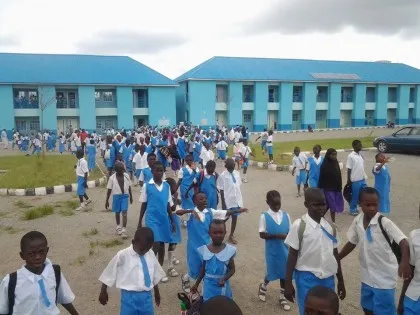Unarguably, the place of education in our march towards sustainable development cannot be overemphasized. Without any iota of doubt, education is the best legacy which parents can bequeath to their children.
Not only has education remained the major process through which a human being is developed and a window to life, it is also the key to development.
The late Nelson Mandela could not have been more correct when he described Education as ‘the most powerful weapon which you can use to change the world’. As it is often said, no nation develops beyond the level of its education. Indeed, many things rise or fall with the standard of education.
Aware of the preeminent place of education in a people’s life and determined to change the narrative of Nasarawa state’s educational status, Governor Abdullahi Sule listed education as one of the priority areas of his administration.
To this end, Governor Sule has to a greater measure, within the last three years, made remarkable achievements in strengthening the primary education sector which is the basis upon which all other forms of education thrives.
In a declarative speech which emphasized his determination to reposition the education sector, Governor Sule said: “Not only the provision of facilities or conducive atmosphere but there must be qualified teachers that would man our schools which are in dire need of teachers to fill in the deficit of staff”.
On assumption of office, Governor Sule constituted a committee saddled with the responsibility of conducting a baseline survey of all primary and secondary schools.
The Professor Mohammed Isa Kida led committee did what many described as a thorough job and presented a report which revealed some of the immediate, short and long term requirements of the state’s 1,391 primary schools and 419 Secondary schools made up of 19 Junior secondary schools and 320 Senior secondary schools out of which 29 are boarding. Specifically, the committee said about 90 per cent of the schools are comatose.
Disturbed by this damning report, Governor Sule declared a state of emergency on public schools and extended an invitation to philanthropists and other public-spirited individuals to collaborate with the state government in addressing the rot in the education sector.
The governor then articulated a development agenda in which basic education was given special attention in view of its critical role in societal growth and development. The state government drafted an Education Development Plan (EDP) geared towards providing a fertile ground for the administration to actualize its vision and mission in turning around the education sector.
Three years down the line, without any fear of contradictions, Governor Sule has achieved what others did not achieve, especially in the basic education sub-sector in Nasarawa state.
Pursuant to his avowed commitment to the provision of improved learning environment to boost basic education in the state, Governor Sule approved and released the state matching grant to access Universal Basic Education (UBE) intervention funds from 2019 to date.
Determined to reposition the primary education considering the fact that it remains the bedrock upon which both the secondary and tertiary education stand, Governor Sule ensured that the sector is accorded top most priority. To this end, and as observed earlier, he ensured prompt payment of a counterpart fund to enable the state to seamlessly access the Universal Basic Education funds.
Plausibly, the state government released the 2016, 2017, 2018, 2019, 2020 and 2021 counterpart funds and hence has the needed funding from the Universal Basic Education Commission to embark on massive construction, renovations, remodeling, and building of more classrooms and provision for instructional materials.
Consequent upon this, the state government made a giant leap including the fact that sixty two (62) projects were completed, 197 classrooms builts and no less than four perimeter fences constructed in primary schools using the 2016 UBE intervention fund (3rd and 4th quarter).
Similarly, the 2017 UBE intervention fund was also used to construct no fewer than two hundred and twenty two (222) projects, all of which have been completed, with no less than five hundred and fifty three (553) classrooms provided, fourteen perimeter fence constructed, thirty six toilets built, fifty hand pump boreholes provided to consolidate the fight against open defecation and, strengthen hygiene.
Additionally, one thousand, two hundred units of furniture comprising both metal and wood, were provided to ease learning, for the pupils.
Like the previous interventions, the 2018 UBE intervention fund was judiciously utilised consequent upon which no less than two hundred and fifty three projects were completed with five hundred and forty two classrooms provided. Also, sixty toilets were constructed and eighteen hand pump boreholes sunk even as fifty perimeter fences were constructed with sixteen thousand units of furniture- both metal and wood- provided.
In line with the precedence set in place, the 2019 UBE intervention fund was used to provide three hundred and forty two projects out of which all except one, have been completed. Under the 2019 intervention, the state government built seven hundred and eighty classrooms, constructed fifty two toilets and sank twenty five boreholes. Furthermore, no fewer than ten thousand, forty units of furniture was provided. Interestingly, the state conducted geophysical surveys of twenty five locations.
Expectedly, the 2020 and 2021 UBE intervention funds were judiciously utilised as a result of which the state government embarked on two hundred projects out of which fifty five have been completed with the remaining one hundred and forty five still ongoing. To consolidate the war against open defecation and boost hygiene among the primary school pupils, the government constructed fifty two toilets and provided forty nine hand pump boreholes with no fewer than sixteen thousand, nine hundred and thirty nine units of plastic furniture provided for schools.
It is on record that the Governor Abdullahi Sule-led government, from 2016 to 2020/21, constructed one thousand, seventy (1,070) projects out of which nine hundred and thirty three (933) have been completed with one hundred and fifty six (156) ongoing. The number of classrooms provided stood at two thousand, four hundred and thirty seven (2,437) while fifty four thousand, nine hundred and seventy nine units of furniture were provided, one hundred and seven hand pump boreholes sunk just as the total number of toilets constructed stood at two hundred.
The current administration in the state has remained committed to boosting education through improved budgetary allocation to the sector. In 2020, the state budgeted N26.3billion for education. The amount was increased to N35.4 billion in 2021. While in 2022, the administration of Governor Sule earmarked N31.9billion for this all-important sector, it jerked it up to N37.43 in the 2023 budget.
Adequate provisions were made for training and retraining of teachers just as the state has continued to collaborate with other development partners like the Global Partnership on Education-GPE- that are working to advance education.
As at the last count, no fewer than 1,876 teachers have been trained on digital literacy. Apart from manpower development, the administration has been making a mark in the area of aggressive renovation of schools and provision of teaching and learning materials. There is also the renewed focus on renovations, expansion and provision of tools and other equipment to Technical Colleges in the state as demonstrated by the utilisation of the UBE intervention of funds and the state’s budgetary allocation to the education sector.
The government’s commitment in the sector has translated to increased enrolment, retention and completion even as its partnership with other stakeholders like The United Nations Children’s Education Fund-UNICEF-has culminated in the return of 10, 353 out-of-school pupils to school in two local government areas of the state.
It is on record that the state government is collaborating with UNICEF on a back-to-school initiative, a special project for which the pilot phase is being implemented in 370 primary schools in Lafia and Nasarawa LGAs.
The governor’s emphasis on training and retraining of teachers is exemplified by the frequent capacity building workshops, some of which were done in collaboration with development partners.
One particularly spectacular training was that which focused on a child-centre approach to education, conducted for Early Childhood Development and Education (ECDE) teachers. The workshop, jointly organized by the state government, Global Partnership for Education and UNICEF, aimed at boosting primary education through enrolment, retention and completion.
Tellingly, these efforts and many more in basic education are aimed at creating a conducive atmosphere for teachers and students for better learning outcomes. This is a spectacular feat in all ramifications, which emphasized the need for the well-meaning citizens of the state to applaud the governor for his foresight, commitment and resilience.
Interestingly, the government’s plethora of interventions have translated into increased enrolment, retention and completion of primary education in the state. With a conducive environment provided for teaching and learning, coupled with other incentives including the school feeding programmes, primary school enrolment was bolstered.
It is heartening to note that the three levels of education-primary, secondary and tertiary-are being accorded the deserved attention in line with the overall drive of putting the state on a sound educational footing to compete favourably with its peers.





